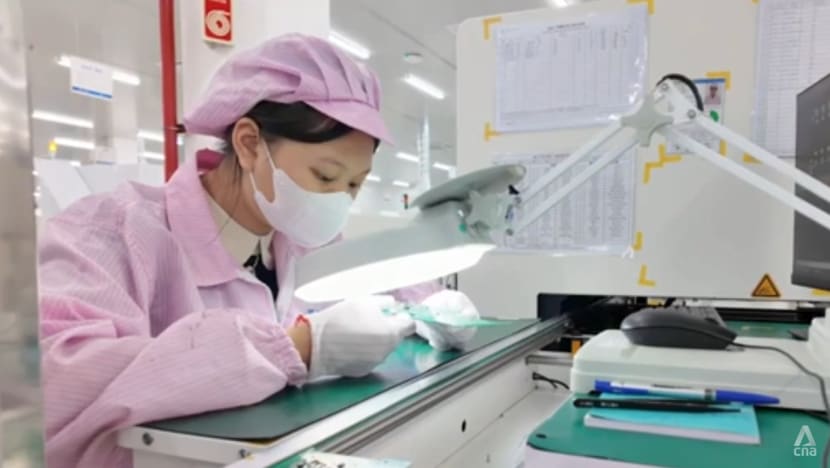Vietnam’s gains from ongoing US-China trade war could be on shaky ground
Vietnam has seen a surge in foreign investments as more companies seeking to avoid US tariffs on goods from China relocate there.

IBE Electronics relocated from China to Vietnam because its US clients were worried about bearing the brunt of their country's import duties on Chinese goods.

This audio is generated by an AI tool.
HANOI: IBE Electronics’ factory in Vietnam’s northern Bac Ninh province counts US electric vehicle giant Tesla among its customers.
Ms Angel Xu and her husband founded the company in China’s manufacturing capital Shenzhen two decades ago, with the initial aim of serving the local market.
As China gained a reputation for being the factory of the world, the firm took on several American clients.
But when import tariffs were slapped on Chinese goods in 2018 amid a trade war between China and the United States, these clients asked for their manufacturing to be shifted elsewhere.
“In 2019, we thought about which country is better. Then we chose Vietnam because Vietnam is close to China,” said Ms Xu.
She said it took the firm six months to relocate to Vietnam from China. She noted that US customers would otherwise have had to cough up 25 per cent in tariffs.
VIETNAM’S GAIN
Vietnam is among a few Southeast Asian countries that have benefited from the ongoing trade tensions between the world’s largest economies.
The country has seen a surge in foreign investments as more companies like Ms Xu’s seek to avoid US tariffs on goods from China, which have continued to increase.
According to Vietnam’s official data, Chinese investors poured in nearly US$4.5 billion worth of investment into Vietnam - a 78 per cent increase compared with the year before.
Vietnam has also seen a major increase in exports to the US. Vietnam’s exports in computer and electronics parts to the US market reached more than US$13 billion in the first seven months this year, a year-on-year increase of more than 50 percent.
In May this year, the US said it would increase tariffs on Chinese semiconductors from 25 per cent to 50 per cent by 2025.
Other tariffs - including a 100 per cent duty on Chinese electric vehicles, 50 per cent on solar cells, and 25 per cent on steel, aluminium, EV batteries and key minerals - went into effect on Sep 27.
Despite the cost savings it can pass on to customers from operating in Vietnam, IBE Electronics still has to battle some challenges.
Due to the country’s nascent supporting industry, the production time is two weeks longer there compared with its factory in China. There is also an additional 5 per cent shipping cost.
POTENTIAL FUTURE IMPORT TARIFFS
Relocating from China may also not protect companies from the risks of further escalations in the trade war.
Analysts expect the standoff to continue regardless of whether Democratic presidential nominee Kamala Harris or her Republican rival - and former president - Donald Trump wins the election on Tuesday (Nov 5).
However, under a Trump administration, several countries could have a reason to fear the future of their trade ties with the US.
Trump announced that if reelected, he will impose 10 to 20 per cent in duties across the board on all imports. This is separate from the tariff of 60 per cent or more on Chinese imports into the US that he plans to put in place.
“Many more Chinese companies will come to Vietnam in the future. However, we are also worried about tariffs on Vietnam as well, so that's why we need to have a facility in the US,” said Ms Xu.
Despite the uncertainties, she said her firm expects to double its Vietnam workforce from about 700 currently.
Vietnam has more to offer than being an alternative for firms looking to evade tariffs, said Mr Michael Kokalari, chief economist at Vietnamese investment management firm VinaCapital.
With China shifting its focus to higher value-added products, Vietnam can fill the void left in the assembly part of the manufacturing process, he said.
Amid expectations that the US-China trade war will further disrupt the global supply chain, Vietnam is taking steps to ensure it retains its growing advantage.
Its top leaders have stressed the country's determination to speed up reforms, pledging to create a competitive business environment by streamlining administrative procedures and promoting sustainable practices.



















